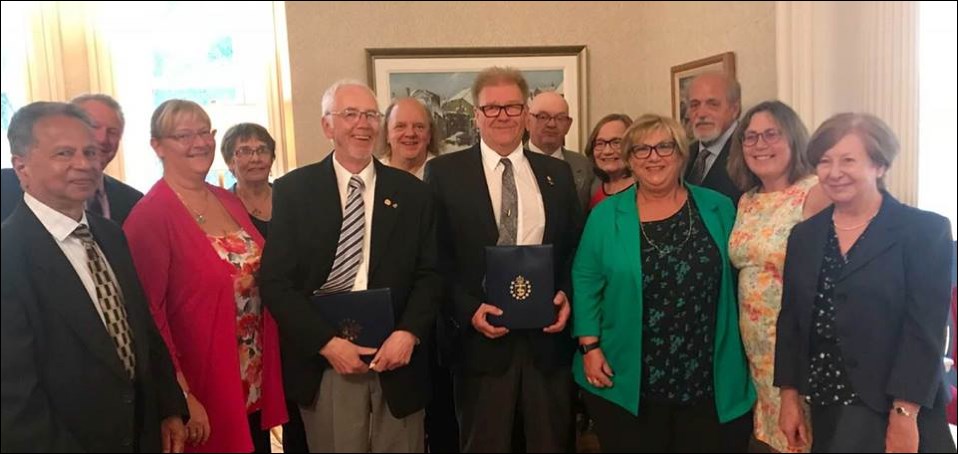Gerry Clark and Don Peake have spent years chronicling the history of Flin Flon. Recently, the two had a chance to write a little history themselves.
Clark and Peake were two of five people to receive Lieutenant Governor’s Historical Preservation and Promotion awards at Government House in Winnipeg on May 15. The pair were the only northerners to be honoured. Both men were caught off guard by the honours they received.
“I didn’t really expect anything like this. I’m not really sure what I think about it,” said Clark.
“I knew somebody had put in an application last year or the year before,” added Peake. “I didn’t even realize it was happening. When I got the call about it, I went, ‘Oh… okay?’ It felt good.”
Clark always had an interest in history, even before he came to Flin Flon for the first time.
“The reason I came to Flin Flon was partly because it wasn’t like any place I’d been to, in the beginning. It was not unlike the Klondike to me,” he said.
“In the first year, I latched onto people who had been here since the beginning and asked them about stories, remembering stories. It just sort of continued along. Fifty years goes by pretty quick, I guess.”
Clark, who spent his career teaching at Hapnot Collegiate, quickly became a favourite history teacher to students.
Not content with the traditional way of teaching history, Clark defied provincial curriculum and began teaching some of the old stories about Flin Flon he had heard in the past.
“When you become a teacher, you have to follow curriculum. When I went to teach Grade 11 history, I didn’t like the curriculum. It was all about explorers and politicians, it was about exams and tests,” he said.
“For me, history was all about stories.”
Clark began compiling slideshows and giving walking tours throughout Flin Flon, pointing out the locations of civic landmarks past and present. He created an in-depth catalogue of Flin Flon’s gravestones, profiling the individuals interred, and was a founding member of the Flin Flon Historical Society.
While he never officially held the post, Clark became Flin Flon’s de facto city historian. He was nominated for the award by the office of the mayor and city council.
When looking back on his body of work, Clark is perhaps most proud of his efforts to memorialize David Collins, the Aboriginal guide who is credited by some as the true discoverer of the Flin Flon ore body.
“I talked about for as long as I knew of it,” said Clark.
He said discussions around honouring Collins were kickstarted after Clark wrote a small production for Culture Days.
“I wrote a little play up, where I acted as Tom Creighton and Ron Burwash was David Collins, and we had died and gone to heaven,” he said.
“After that show was over, several people in the audience came over to me and said, ‘We ought to do something about having David Collins remembered.’”
A group of concerned locals, including some of Collins’ descendants, joined forces and dedicated a memorial cairn to Collins at Neighbours of the North Park.
“We had a really good cross-section of people who worked very well together. I was really proud of that,” he said.
The other recipient of the Lieutenant Governor’s award from Flin Flon was Don Peake, one of Clark’s former students.
“He was my Grade 11 history teacher,” confirmed Peake.
Peake began restoring and categorizing the archives at the Flin Flon Public Library several years ago, spending hours painstakingly scanning documents and photos.
He was nominated by the Flin Flon Heritage Project, one of the groups that worked with Peake and the library on the project.
In 2016, Peake’s work suffered a major setback. The basement of the Flin Flon Public Library, where most of the historical documents Peake worked with were stored, flooded. The remaining documents were located at Flin Flon City Hall, where they have sat for almost two years.
“Most of the work I’ve done has been prior to the flood. As soon as everything was moved to City Hall, that kind of ended my scanning,” said Peake.
“I’m going to say it might be about two-thirds done – maybe. There’s a lot of old papers in there, but there’s microfiche there and the Manitoba Archives have all the papers.”
The process of moving the documents back to the Library has begun – this time, they will sit on shelves to avoid future catastrophe – but the process of reorganizing and moving the documents requires time and additional work.
“There’s a lot of work still to do at city hall yet. When they get the resources to move it, they’ll move it and I’ll get busy sorting and filing,” said Peake.
When it came time for his honour, Peake was humbled. Out of the five historians honoured, Peake was the youngest.
“I’ve put in a lot less time on things than some of those guys have,” he said.
“One of the gentlemen there has worked 35 years for the Manitoba Archives, he’s written books and papers on stuff. All I’ve been doing is compiling and scanning, trying to put stuff together. Realistically, I’m a real youngster in this game,” said Peake.




